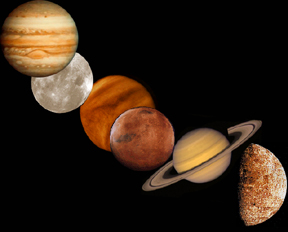
Art Explosion ClipArt
Related links:
How to??
News story originally written on February 4, 1998
Many news magazines often include a 'How to' section. How to fix your car yourself, how to get that pizza stain out of your new silk blouse, how to fill out those pesky tax forms. Well, we figured why not join the crowds! This piece is written by our in-house astronomer...How to become an astronomer!
Becoming an astronomer is as simple as stepping outside on a dark night, gazing at the stars, and thinking about what you see. You may want to purchase some books which tell you about the night sky and how to locate constellations. After you have learned to identify some constellations, I would recommend purchasing some binoculars. They are relatively inexpensive, easy to use, and a lot of fun. There are many interesting objects which can be viewed with binoculars, and I would highly recommend the book 'Touring the Universe with Binoculars' to get you started. When you feel that you have mastered exploring the sky with those, a small telescope might be worth the money.
Amateur astronomy clubs are a great place to meet other people who are also interested in astronomy, and there are many such clubs around the world. They often hold 'star parties' which are open to the public, and at which you can learn a lot about becoming a star-gazer. Finally, Windows to the Universe is just one of many sites on the Internet which will introduce you to virtually any aspect of astronomy.
Becoming a professional astronomer, someone who makes a career out of astronomy, requires many special skills and a lot of hard work. But if you love science, challenging problems, and studying the stars, planets and the other fascinating inhabitants of the universe, it will be worth it! As a first step, you should take physics and math courses during high school. In college, you should major in physics or astronomy, and take math and computer courses as well. If you are interested in studying the planets of our solar system, you may want to concentrate your studies on geology. Then, in your senior year, you will apply to astronomy programs at graduate schools. Typically, an astronomy doctoral candidate spends around 6 years in graduate school. That's 10 years total time in college - more than some types of medical students!














